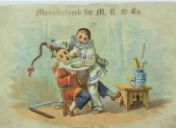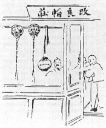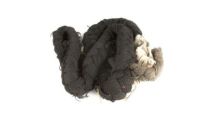Queue shaming
There is more than one possible explanation for why our queue was cut off, just as there might also be more than one reason for the introduction of large pieces of non-hair into a queue, like this large red tassel.
In 1871, after being persuaded by Yung Wing (1828-1912), China’s first graduate from an American University, the Qing government sent a group of 120 students abroad to the United States to study. However, they were recalled early due to extensive Americanization: they dated local women, played American sports etc. And, they started to hide their queues! Was our queue also hidden? Many Qing students who went abroad became victims of racism. People of East Asian descent were not welcomed in the United States at the time. The queue in particular became a target of racist outbursts. It was even targeted by American authorities in San Francisco who wanted to force Chinese prisoners to cut the queue off to prevent fleas from spreading. These laws did not pass due to the equal rights advocates who argued that it specifically targeted the Chinese. It was vetoed and not put into effect, but the queue was still often the target of anti-Chinese sentiment which is described clearly by diplomat W.W. Yen (1877-1950):
Speaking of going about in New York in Chinese clothes, I had a very unpleasant experience when going to visit a museum with the Consulate attache. He had been confined largely to the house, as he did not speak English and no one cared to take him out. He seized the opportunity provided by my presence to go with me to see the town. Unable to afford a cab or a carriage, we traveled by horse tram, but as soon as we left it to go on foot to the museum, we were surrounded by a mob of street urchins, who not only jeered at him, but even commenced to pull his queue. [cf, p 22-3]
It is no surprise that many Chinese abroad thus decided to hide their queue. The diplomats, students, and other officials took notice of the negative images that plagued the queue overseas.[cf, p.84] Though it was not necessarily forced upon the students abroad to cut off their queues, the social environment they found themselves in made doing so a logical step. However, for those who did cut off their queue, going home also became a problem.
One of the Chinese who struggled with this was Lu Zhengxiang (1871-1949), a diplomat and the first foreign minister of the Republic of China in 1912. His planned visit to high Manchu officials could, of course, not be done without a queue:
Two years later, returning to China, instead of going immediately to Pekin, I stopped at Tien-Tsin and from there informed the Minister for Foreign Affairs that I would have to remain six months in that city before I should be able to present myself in the capital, since I had cut off my queue and that time was necessary for it to grow again. The Minister replied that he authorised me to present myself at the Department without wearing a queue, but that he asked me, for the only visits that I would have to make, to the Prince Regent and to the Prime Minister, Prince K’ing, to wear a false one. The question of principle being conceded, I did not insist any more, and for those two visits I submitted myself voluntarily to what was not more than a formality.[1]
Returning from his study abroad in Japan, Lu Xun (1881-1936) faced a similar problem, which he described in his ‘Story of the hair’[cf]. He too got rid of his queue while studying overseas. Since he could not present himself back in China without a queue, Lu Xun purchased a fake one in Shanghai upon his returnhttps://zh.m.wikisource.org/zh-hans/%E7%97%85%E5%BE%8C%E9%9B%9C%E8%AB%87%E4%B9%8B%E9%A4%98. The barber there specialized in making fake queues. His work was good enough to make sure others did not notice the braid was fake. The barber’s name was known by all Chinese students who went abroad. However, upon closer inspection, others would notice that the queue was fake. Back home, Lu Xun was called out by the others in his town, who called him a “fake foreign devil”.[cf]
Many of the overseas Qing students faced the same problem as Lu Xun. Returning home, they realised that they needed to get hold of a queue. The market for fake queues must have been vibrant. But looking at our queue here, was this not also the moment in which people started to become more creative in extending the length that they grew back in the years following their return to Qing China? Did their hybrid queues perhaps start a trend, providing people a chance to show their style and class, and helping small children look smart? In any case, by the end of the Qing, queues such as ours would not have been an uncommon sight.





